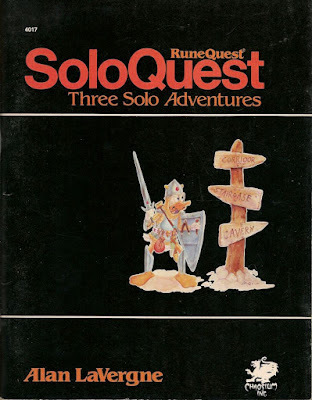Retrospective: SoloQuest
 For obvious reasons, the last few years have seen a resurgence of interest in solo adventures for use with roleplaying games. Adventures of this sort have a long pedigree, going back at least as far as 1976's Buffalo Castle for Tunnels & Trolls. Other attempts to present a referee-less scenario for use by a single player followed, employing a number of different approaches, some of them quite exotic, like invisible ink and a "magic viewer."
For obvious reasons, the last few years have seen a resurgence of interest in solo adventures for use with roleplaying games. Adventures of this sort have a long pedigree, going back at least as far as 1976's Buffalo Castle for Tunnels & Trolls. Other attempts to present a referee-less scenario for use by a single player followed, employing a number of different approaches, some of them quite exotic, like invisible ink and a "magic viewer." The most successful ones, however, followed in the footsteps of Buffalo Castle (or perhaps Sugarcane Island?) by presenting a series numbered paragraphs read according to the narrative choices of the reader. This is the format adopted by Steve Jackson and Ian Livingstone's phenomenally successful Fighting Fantasy series of gamebooks, for instance. It's also the format Chaosium employed for its own forays into the field of solo gaming, starting with SoloQuest in 1982.
Written by Allen LaVergne, who was a player in Steve Perrin's Pavis campaign, SoloQuest presents three adventures for RuneQuest suitable for use by a single player without the need for a referee. The scenarios are not specifically connected to Glorantha and the book's introduction suggests they're completely usable by a character from any RuneQuest setting. The first of these scenarios is "DreamQuest," the most straightforward of the three. Its premise is that the character's favored god appears to him in a dream and asks him "to fulfill a mission, a symbolic reenactment of [the] god's conquests. Unlike most dreams, in this one there are real risks to run and real rewards to gain."
What follows is a series of combat encounters, in which the character's dream self must overcome ever more powerful opponents. There are twenty such encounters, ranging from Sardanik Scrolleater, an armored baboon with a spear, to Errol, a swashbuckling manticore, to Huey and Looie, a pair of ducks, and many more, culminating in the final battle – against the character's doppelganger. Almost all of these encounters are idiosyncratic in one way or another, reflecting the opponent's personality and nature. They typically include an outline of the opponent's tactics in combat and some even note the conditions under which combat might be avoided. "DreamQuest" isn't really an adventure so much as an excuse to run some battles using the RQ rules. How much one enjoys that will likely determine how much one enjoys the scenario as a whole.
The second adventure is "Phony Stones," which concerns the sale of "bogus statues of Issaries" to naive individuals hoping that, by buying them, they might be initiated into the god's cult. The temple of Issaries is thus offering a sizable reward for anyone who can find and capture the perpetrator of this deception. The setting of the adventure is a small town of about 50 residences, which the character will need to investigate to unravel this mystery. Unfortunately, the limitations of the solitaire format hamper one's ability to do so as effectively one might during refereed play. For example, interactions with NPCs are largely pre-scripted, meaning you can only perform whatever actions the numbered paragraphs offer you, which, in many cases, are very few. The end result is fairly unsatisfying, even compared to your average Fighting Fantasy book.
The third adventure is "Maguffin Hunt." The Duke of Jawain hires to the character to enter the hideout of a band of dwarves who have stolen his maguffin. Despite the fact that the duke "will provide a very detailed description of the maguffin," nowhere does the text actually do so. I am left to presume that this ambiguity is intentional, allowing it to be whatever the player imagines it to be. If so, the scenario never makes this clear, which is all the more vexing since, at its conclusion, the character discovers the dwarves no longer even have it. They've sold it to a third party and there's not a hint as to the identity of the buyer. Even so, "Maguffin Hunt" is a little more enjoyable than "Phony Stones," since it's largely a series of combat encounters, which the solo format handles reasonably well, rather than the frustratingly limited investigations of the previous adventure.
Ultimately, that's the biggest problem with SoloQuest: its scenarios rarely rise above the level of scripted combats, which strikes me as almost criminal when dealing with a game like RuneQuest, whose strength has always been its richly detailed settings and interesting characters. Of course, how one would succeed in presenting such things within the context of a solitaire adventure is a vexing question even in 2023. The computer RPGs of the present are vastly more sophisticated and complex than something like SoloQuest and yet even they often struggle with presenting an imaginary world and its inhabitants with the kind of depth to be found in even a mediocre tabletop session with other human beings. Consequently, I can't judge SoloQuest too harshly for its shortcomings, though I nevertheless wish it were better than it is.
James Maliszewski's Blog
- James Maliszewski's profile
- 3 followers



